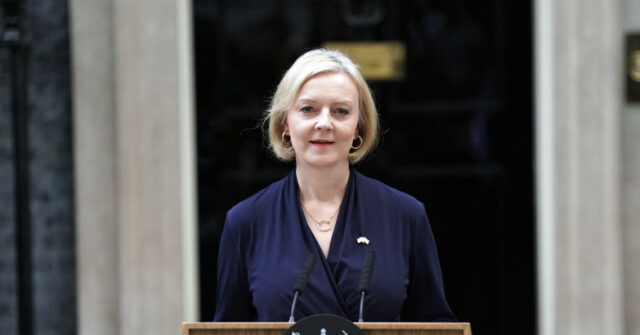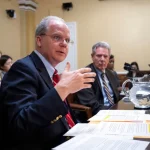

UK Prime Minister Liz Truss has announced she is resigning, having spent just 45 days in post and likely to hand over power after just 52 days.
Key points:
- UK Prime Minister Liz Truss has resigned after just 45 days in post
- The last days of her reign have the hallmarks of her having failed to fight off a counter-revolution, or coup, by the globalist, europhile establishment of her party who deeply objected to her pro-border control, low-tax policies
- Her resignation follows the removal of her interior minister and finance minister, both among the most obviously pro-markets, and ‘small-c’ conservative individuals to hold those posts in a generation. Their politics clearly did not align with the pro-globalist, fiscally-orthodox faction taking back control of the party and the government at this moment
- A one-week leadership election will follow, which Westminster insiders believe Boris Johnson’s right-hand-man Rishi Sunak is almost certain to win
The story continues below…
Speaking outside her official London residence and office of 10 Downing Street Thursday afternoon, Liz Truss said because she was unable to deliver the programme she had been elected to — namely reforming the United Kingdom into a low-tax, high-growth economy — she was going to stand down. She said:
…I recognise though given this situation I cannot deliver the mandate on which I was elected by the Conservative party. I have therefore spoken to His Majesty the King to notify him I am resigning as leader of the Conservative Party. This morning I met the Chairman of the 1922 Committee, Sir Graham Brady. We have agreed there will be a leadership election to be completed within the next week.
This will ensure we remain on a path to deliver our fiscal plans to maintain our country’s economic stability and national security. I will remain as Prime Minister until a successor has been chosen. Thank you.
Truss framed her remarks and her brief time in office as having taken place during a time of upheaval, citing Putin’s war in Ukraine and economic instability.
So that’s it. After 45 days as PM, Truss goes.
The replacement will be a stich up by Tory MPs.
The party is now Labour-lite and serves no purpose.
— Nigel Farage (@Nigel_Farage) October 20, 2022
The resignation comes 45 days after Truss was handed power by Her Majesty the Queen, then still alive, from the previous leader Boris Johnson, who stood down after a series of scandals rocked his government. With the exception of the short period in which the Duke of Wellington was caretaker Prime Minister in 1834 — the first choice for Prime Minister was abroad and it took that long to recall him to London — Truss now has the dubious honour of being the shortest-lived UK leader ever.
In a bitter blow to Truss, it has to be recognised that if the process to replace her concludes in a week and she spends a total of 52 days in power, it will remain the case she will have been in Downing Street longer than it took the leadership process to select her, at 62 days. Boris Johnson announced his resignation on July 7th and handed over power on September 6th this year.
Yet, even at this stage, it is questionable whether Truss has really been in charge for the past week. Never anything more than a milquetoast, fractionally-right wing pro marketeer, a hostile political and media environment combined with her own lack of political experience saw her very modest reforms violently shot down.
Such was the force with which proposals including reducing the standard rate of income tax by just one penny in the pound and returning the top rate of tax to the level it had been at for the whole of the previous Labour government, Truss felt obliged to fire her top ally in government, chancellor Kwasi Kwarteng just weeks into her leadership.
At this point, Cameron-era holdover Jeremy Hunt, a pro-China globalist and opponent of Brexit, seems to have been placed into the finance role above the head of Truss, and became the de-facto Prime Minister. While the United Kingdom is totally unfamiliar to such arrangements, it does appear Hunt has really been making the decisions in recent days, apparently retaining Truss as a useful human shield, allowing a counter-revolution to take place behind the scenes with less scrutiny.
Were Liz Truss to resign, Boris Johnson tops the list of potential successors Tory members would most like to see replace her
Boris Johnson: 32%
Rishi Sunak: 23%
Ben Wallace: 10%
Penny Mordaunt: 9%
Kemi Badenoch: 8%
Jeremy Hunt: 7%https://t.co/ftgIKn7xZv pic.twitter.com/fOxT2Ixjuc— YouGov (@YouGov) October 18, 2022
Hunt’s big decisions included demolishing almost all of Truss’s policies, including reversing most of her tax cuts, and severely cutting down the scale of the winter fuel support. Another big idea of the short-lived Truss government was to actually live up to long-term Conservative party promises to voters to control immigration, yet this ambition immediately contradicted the Hunt-de-facto-government’s conviction that open-borders immigration means economic growth.
While it was reported at first that Suella Braverman, the most recognisably ‘conservative’ member of the government had been “sidelined” on immigration because she refused to play along with open borders, this row broke into the open yesterday when she dramatically resigned, accusing the government of not keeping its promises as she did so.
Whether Truss has now been discarded by the Hunt faction as no longer useful at this point, or whether she took her own decision to leave and no longer be associated with a government that does not embody her own views and appears not to answer to its theoretical leader, is presently unknown.
So now the Conservative Party embarks on another leadership competition. Mercifully, the party seems to have learnt from the big mistake of the Boris-replacement race which saw Truss become leader, which was a colossal six-weeks long and ran out of steam well before its end. Instead, Truss says, the competition to replace her will last just one week, meaning the United Kingdom will likely have a new Prime Minister in time for next weekend.
What this short, sharp process does mean is there’s little chance the members of the Conservative Party itself will have a say, and it will likely be determined solely by members of the Parliamentary party: Conservative MPs. This will feel more like a coronation than an election, and there’s every chance Rishi Sunak, Boris Johnson’s former Chancellor of the Exchequer will win.
Sunak’s bland, managerial, conventional style is only ruffled by one problem: he is the only Member of Parliament besides Boris Johnson who has been convicted of breaking Coronavirus lockdown rules, the very infraction that brought the Boris Johnson government down. Is this all forgotten, or will that come back to haunt the party?
1/2 Today’s tragi-comic events stem directly from the fact that the Tory Party has no reason for existing, apart from the pursuit of office. Even its internal contests are essentially meaningless.
— Peter Hitchens (@ClarkeMicah) October 20, 2022
This story is developing, more follows






